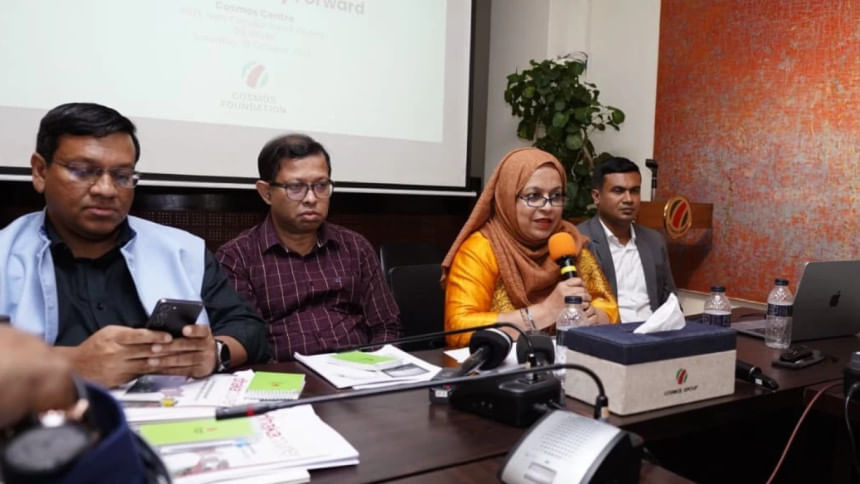Originally posted in The Business Standard on 20 October 2025
Don’t use public money to bail out banks: speakers

Effective banking sector reform cannot be achieved without holding accountable those who looted banks during the past Awami League government, particularly after 2017, speakers said at a seminar yesterday.
The effort to recapitalise failing banks repeats the shameful history in which ordinary people paid for the failure of banks, the salvation of which, after being looted under political protection, required large sums of taxpayers’ money, they said.
The crisis in the banking sector is owed to systemic problems sustained by years of banking data manipulation by the past AL government, political lending, widespread corruption in the banking sector and bankers’ failure to uphold professional ethics, the speakers said.
“Holding the bank looters accountable is undoubtedly central to the banking sector reform,” said Nurun Nahar, deputy governor of Bangladesh Bank, during her speech as the chief guest at the seminar.
Titled “Bangladesh’s Banking Crisis: The Way Forward,” the seminar was organised by the Cosmos Foundation, the philanthropic arm of the Cosmos Group, with the United News of Bangladesh (UNB) serving as the event’s media partner.
The situation of the banking sector was not so bad before 2017, Nahar said, recalling that the fall started taking place after certain Islamic banks were taken over.
The decision to merge several banks and their recapitalisation came to protect the depositors and prevent a systemic crash, she said.
In response to scathing criticisms over the central bank’s failure to regulate the sector and surrender to political pressure, Nahar wondered what steps could withstand such an assault on the central bank’s independence.
“Yes, one could have resigned under political pressure, but could anyone guarantee that their successor would take the right decision? I don’t know,” he said.
Banks regularly suppressed non-performing loan data, giving a false impression of their financial strength so that they could enjoy dividends, the deputy governor said.
“The central bank alone cannot be blamed. Everyone was involved in the process, including directors and those in the management of commercial banks,” she said.
However, the situation is improving with a strong accountability mechanism being enforced. The banking sector is regaining strength, enjoying independence and rejecting any biased and unethical practices, she said.
Towfiqul Islam Khan, additional director of the Centre for Policy Dialogue (CPD), said that the banking crisis is “less technical and more political.”
“The central bank is supposed to be an independent entity. Unless it is allowed to act freely and bank looters are punished, crises will keep returning to the banking sector in the future,” he said.
Towfiq offered the alternative to recapitalise failing banks with profits made by the central bank over the last few years.
In the last financial year, he said, the BB posted a profit of Tk 22,000 crore, which is far higher than the most profitable commercial bank, which logged a profit of Tk 700 crore in the same year.
The BB made similar profits in the two years preceding the last financial year.
If the central bank was responsible for the sector-wide damage, Towfiq said, why should it not use a portion of the profit made to rebuild banks being merged?
The bank merger decision drew strong criticism from the speakers, who likened it to sparing looters and making the victims pay for the crime.
Nehal Ahmed, a professor at the Bangladesh Institute of Bank Management, and MGK Jewel, a consultant at the Asian Development Bank, jointly delivered the keynote paper at the seminar.
Citing examples from other countries, Prof Nehal Ahmed emphasised freeing the central bank from finance ministry influence to establish best practice in the financial sector.
Abdul Mannan, a former executive director of the BB, blamed the lack of good governance for the banks’ mounting non-performing loans, exacerbated by state agencies’ intervention.
Speakers said that there, however, were instances of failing banks making recoveries with time when they chose to uphold professionalism.
Shahidul Islam Zahid, chairman of the Department of Banking and Insurance at Dhaka University, said that Bangladesh’s banks do not care about ordinary depositors and often serve the interests of oligarchs.
He questioned the validity of the government’s plan to merge five troubled banks by injecting Tk 20,000 crore from the national budget.
“Banks have been looted before and recapitalised. What guarantee do we have that it won’t happen again?” he asked.
Muhammad Mahboob Ali, professor of economics at the Bangladesh University of Business and Technology, criticised Bangladesh’s Islamic banking system, calling it one of the worst in the world.
He called for protecting depositors’ interest with an effective insurance policy.
Karmasangsthan Bank director Salahuddin Bablu questioned the practice of adopting monetary policy in light of the national budget, whereas the ideal case should be the opposite. Past bank mergers were not as successful as expected, he said.
He said that the central bank utterly failed to contain inflation, with some of its steps to do so increasing the burden on ordinary people.
M Kamal Uddin Jasim, additional managing director of Islami Bank Bangladesh PLC; Sheikh Md Riyaz Uddin, first assistant vice-president; and business journalist Farhad Hossain Talukder also attended the seminar.
Assuring depositors with five banks due for merger, Deputy Governor Nahar said about 90 percent of them with deposits below Tk 2 lakh would soon get a refund.


